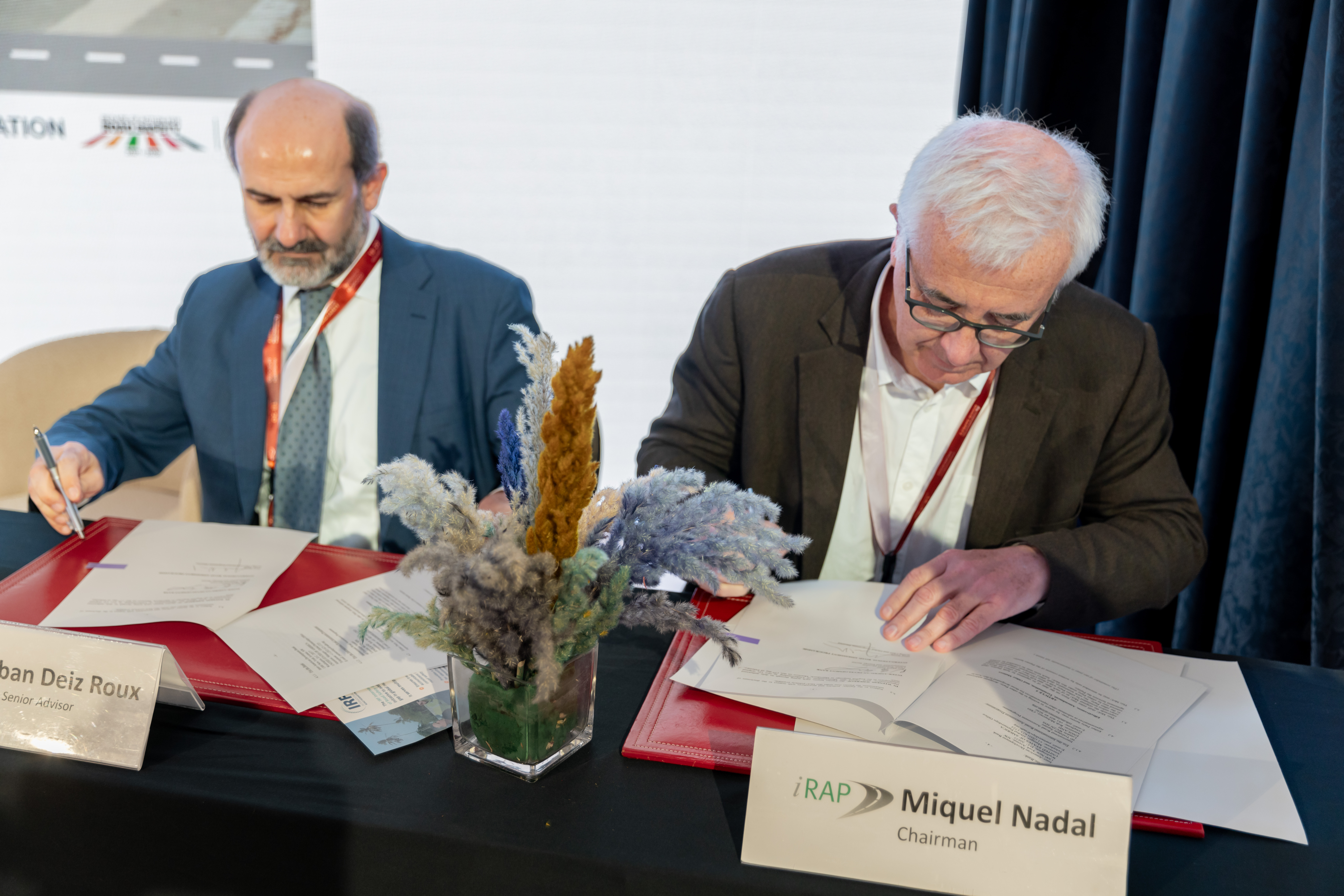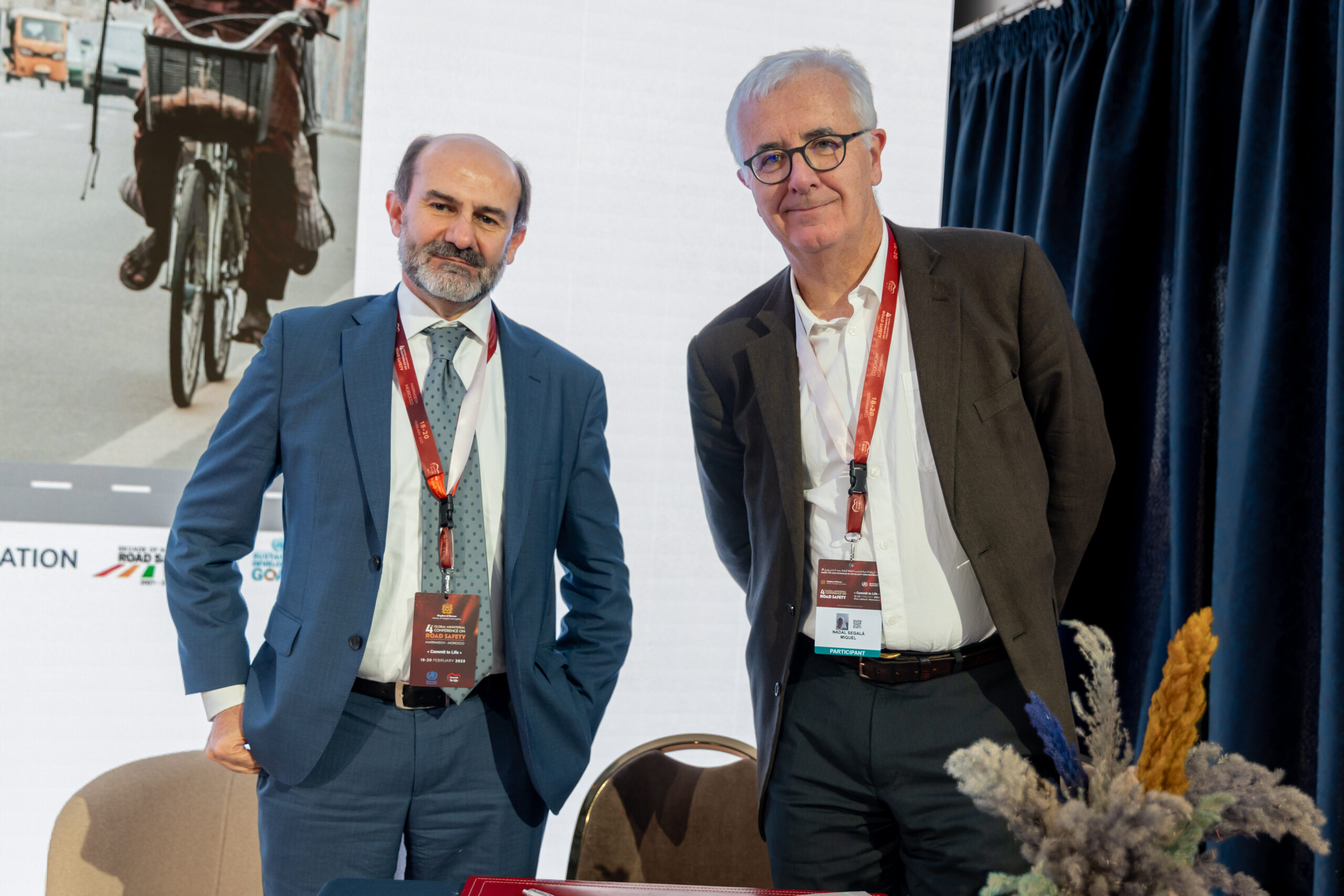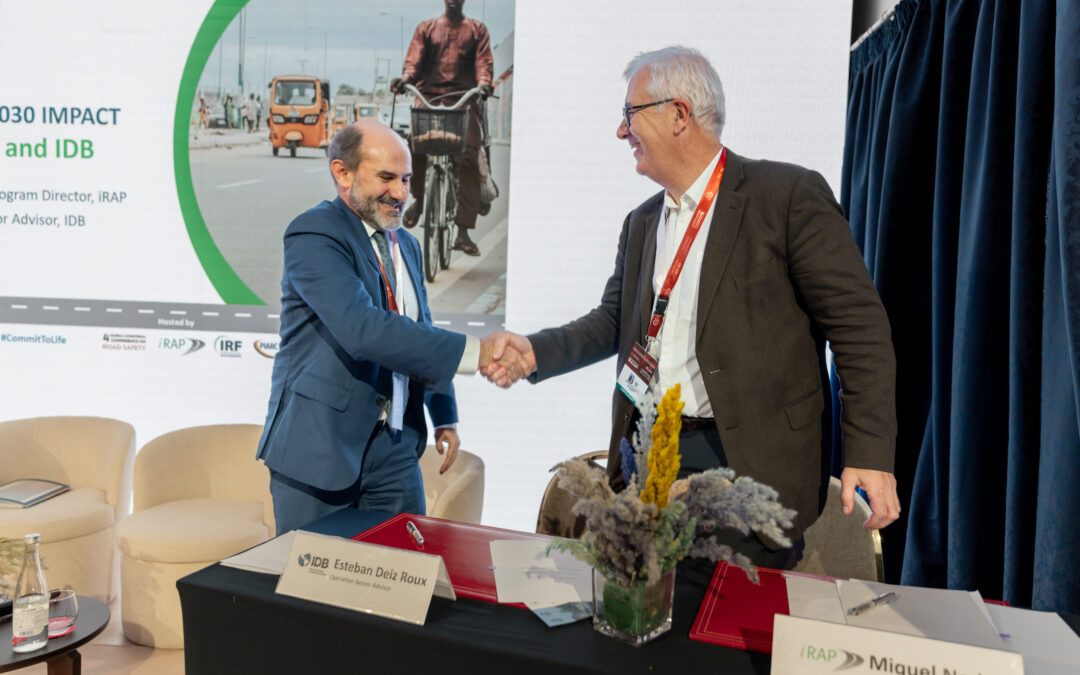Image caption: Esteban Diez Roux, Operation Senior Advisor, Inter-American Development Bank
(IDB) and Miquel Nadal, Director General, Cercle d’Economia and Chair, iRAP sign the MOU.
Eliminating high-risk roads in Latin America and the Caribbean is the major focus of an extended 3-year agreement signed this week between the Inter-American Development Bank (IDB) and the International Road Assessment Programme (iRAP). It brings the organisations’ joint partnership for safer roads under the agreement to ten years.
The agreement was signed by iRAP Acting CEO Greg Smith and Esteban Diez Roux, Operation Senior Advisor of the IDB during the Ten Steps to 2030 for Safer Road Infrastructure Side Event of the 4th Global Ministerial Conference on Road Safety underway in Marrakech.
The 3-year agreement will facilitate extended collaboration between the IDB and iRAP to promote programs and projects to significantly improve the safety of the roads in Latin America and the Caribbean. The new agreement will leverage the expertise of both organizations to conduct road safety assessments, build local capacity, and prioritize investments in safer infrastructure. It will also foster the sharing of information and best practices and promote the use of innovative tools and technologies to improve road safety outcomes.
According to iRAP’s Safety Insights Explorer, it is estimated that nearly 94,000 people were killed and more than five million were injured in road crashes in Latin America in 2021, at a cost of USD$223.4 billion.
The partnership will focus on delivering a measurable reduction in road trauma in the region of Latin America and the Caribbean and contribute to the Sustainable Development Goals (SDGs) and Global Road Safety Performance Targets, particularly the Target 3: “By 2030, all new roads achieve technical standards for all road users that take into account road safety, or meet a three star rating or better”; and Target 4: “By 2030, more than 75% of travel on existing roads is on roads that meet technical standards for all road users that take into account road safety”.
The agreement will pave the way to implement Road Assessment Programmes (RAPs), following the iRAP methodology in Latin America and the Caribbean, which will help reduce the number of casualties and serious injuries caused by road crashes.
The work of iRAP and the IDB will also focus on reviewing the methods utilized in evaluating previous investments in road safety infrastructure and providing guidance and recommendations for future investments, with an emphasis on methods for measuring program effectiveness. Both institutions will also develop communications plans to raise public awareness and training to build capacity compliant with the 3 star or better road safety standard.
Greg Smith, Acting CEO and Global Programme Director iRAP said, “Partnerships are at the heart of the global iRAP program. This collaboration will bring together the expertise of iRAP and its partners with the IDB’s wide range of public and private sector financing options to help countries across the region transform urban and rural road networks for the safety of everyone.”
Speaking at the event, Esteban Diez Roux, Operation Senior Advisor at the Inter-American Development Bank (IDB) said, “We started working with iRAP in 2010. We did the Pacific Corridor, which is basically the backbone that connects all of Central America from Mexico down to Panama. It was about 2,000 kilometres. We did that initial assessment in 2010, and we redid the assessment in 2018, which resulted in 1.56 billion USD investments in that corridor that we’ve done in the last 15 years. We’re going to keep on working on that Corridor and we estimate that in the next 20 years, we’re going to save 30, 000 lives. That was the first project that we did with iRAP. Since then, since 2010, we’ve done an additional 43, 000 kilometres with iRAP.
We’ve changed the way that we work with iRAP. I think that initially in 2010, we saw it more of just an assessment tool. Now we’re integrating that in all our transportation projects.
It’s been very impactful, and the economic benefits are enormous. We’re very proud of the partnership that we have with iRAP.”
Achieving greater than 75 percent of travel in Latin America and the Caribbean on 3-star or better roads by 2030 stands to save an estimated 31,400 fatalities a year and up to 34 million fatalities and injuries over 20 years in the region with a benefit of $7.20 for every $1 spent, according to iRAP’s Safety Insights Explorer.
– ENDS –


Safer roads’ milestones achieved in the first five years of iRAP and IDB’s partnership agreement include financing network analyses for over 28,000 km of roads through loans and technical cooperation. These efforts span the Dominican Republic, Ecuador, the Pacific Corridor, Colombia, Brazil, Belize, and Uruguay, which also include analyses for 55 school areas to support critical infrastructure improvements.
In a major step forward, the IDB has backed the development of ViaSegura, an AI-powered tool optimizing road safety analysis across 10,000 km in Brazil. Additionally, iRAP safety indicators are now embedded in infrastructure loans for São Paulo, Ceará, and Costa Rica, reinforcing a regional shift toward data-driven, safer mobility solutions.
Further strengthening its commitment, the IDB’s Public Private Partnership Unit has integrated iRAP metrics as key performance indicators (KPIs) in highway concessions in Brazil (Minas Gerais and Santa Catarina) and Panama, ensuring that road safety remains a top priority in major infrastructure projects.
Press Contact
For IDB:
Ana Laura Peñalosa
Email: anapen@iadb.org
For iRAP:
Judy Williams
Global Programme and Communications Manager
Email: judy.williams@irap.org

















